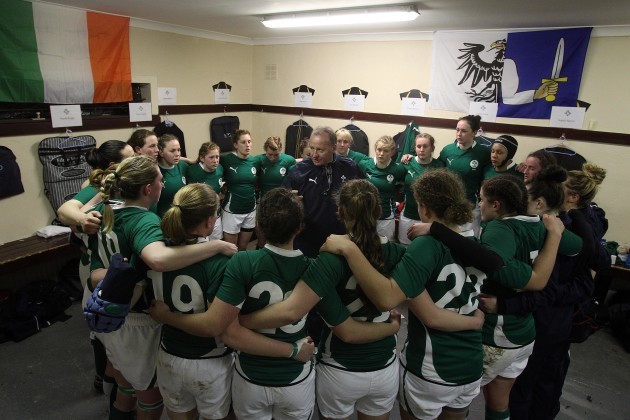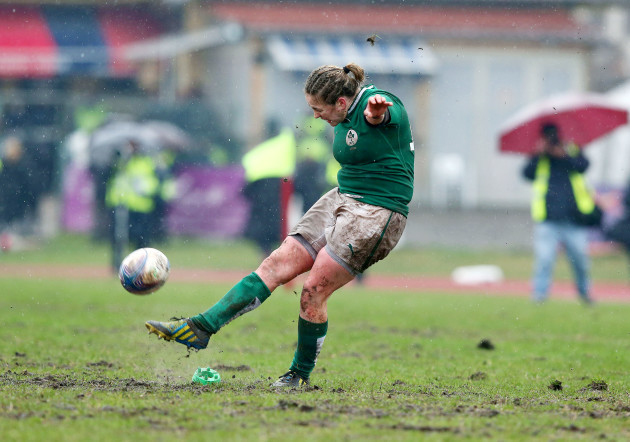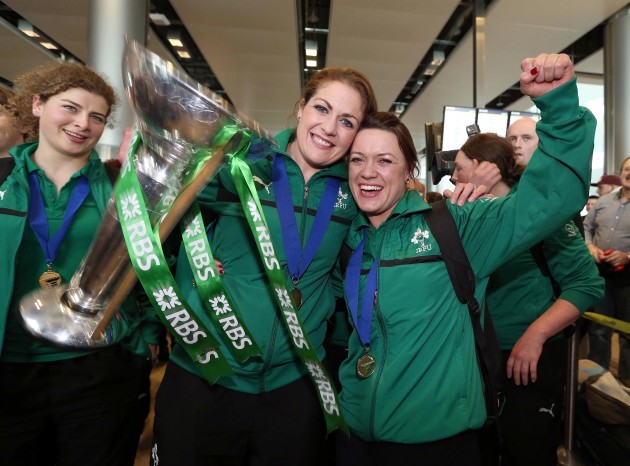This article is the final part of The Cinderella Stories, a series looking at underdog teams who surprised everyone to leave a lasting legacy. Here Garry Doyle outlines the rise of the Irish women’s rugby team.
LET’S START WITH the train journey. Smack bang in the middle of the 2012 Six Nations championship, Ireland were due to play France in Pau. Not Paris – but guess where they were booked to fly into?
Yes, Paris, the plan being that they would be transferred by coach across the city to catch a TGV down south. Alas, the Friday afternoon Parisian traffic played havoc with that idea. So, to cut to the chase, they didn’t catch their intended train and instead of being on their way south, the team ended up stranded in Paris, 23 hours prior to kick-off.
“I was flipping my lid with the IRFU,” the then Ireland coach, Philip ‘Goose’ Doyle, said. “All along we wanted to fly direct to Pau but were told we couldn’t and now we were in a race against the clock to get there, worried the game might have to be cancelled. I was fuming.”
It’d get worse. The French speakers in the party figured out an emergency plan B and booked an overnight train to Pau which was all well and good until you remembered you had a party of 30 to cater for.
“Once we got on the train, it was chaotic,” Goose says. The players nicknamed it the cattle train, the team spread out across two carriages, Goose and the rest of the staff taking it in turns to walk up and down the aisles like sentries. “Our only concern was that the girls were safe,” he says.
Eventually, at 9.15 on the morning of the game, 23 hours after setting off from Dublin, they landed in their hotel. A request to the French Union to change the kick-off time fell on deaf ears. And so ahead of one of the biggest games of their careers, Ireland’s players got two hours sleep before delivering a world class performance. The score was France 8-7 Ireland but Goose knew he’d a team of winners.
Afterwards, captain Fiona Coghlan gathered everyone into the dressing room and thanked the management for the way they had conducted themselves in the midst of this travel farce and for making sure everyone was okay. “We always felt safe,” Coghlan said. “That’s why we played so well.”
And there and then a pact was made. “It was certainly a turning point,” says Goose. “The attitude then was that if we can get through something as traumatic as that journey, then we can get through anything.”
**
The fall-out lasted a week or so. Goose contacted a friend of his to get the travel story into the media. “I pretended I knew nothing when the IRFU quizzed me,” he says now. “Still, to be fair to them, they immediately said, right what can we do to help?”
He’d a long list. For starters, he wanted the team to fly direct to the city where their matches were on 36 to 48 hours prior to kick-off. “Either take us seriously or don’t bother (with us) at all,” he told the union. “Their answer to every request was yes, yes and yes. They were apologetic. They promised a day like that would never happen again. And to be fair, it hasn’t. They kept their word.”
So did the players. After the furore that surrounded that Pau trip, they said to one another that the best way to win respect was to win a trophy. “When you are underdogs, how connected are you with your goal?” asks Lynne Cantwell, a star on that team. “I knew we had the mindset and I also knew we bloody loved being in and around that squad. We pushed one another to get better.”
And that’s exactly what happened in 2013. They played the Welsh first. “We were poor,” Coghlan says. But they won by two points. “That convinced me we had something,” said Goose, “because when it came down to it, they dug it out. After Pau, I made it very hard for anyone to get into the squad. We’d stuck together through that saga. The spirit was unbreakable. We saw that against Wales.”
They noticed it again a week later against England. For much of the previous decade, Ireland had been on a steady, upward curve, chalking up first-ever wins over Wales in ’05, then Scotland in ’07, France in 2009. England, however, was a scalp they’d yet to take. This time they did, winning 25-0, Alison Miller scoring a hat-trick.
“That’s when the belief in the side changed,” Goose said. “It was a big win but the nil was the best bit. The last passage of play, they battered us and battered us, trying to get across our line. Thirty-eight phases they went through. We defended for our lives. But through sheer bloody-mindedness, we held on.”
The Scots were next. Another win and a first ever Triple Crown. “There was no actual Triple Crown trophy,” Coghlan points out. It wasn’t the only thing missing. That year, Ireland were the only team represented at the Six Nations launch – male or female – without a sponsor’s name on their jersey.
If they felt like second class citizens they certainly didn’t complain about it. “The goal,” Cantwell said, “was not about getting publicity for ourselves. It was about fulfilling what we wanted to achieve.”
It’d happen. At half-time against France, they trailed 10-5. “Their team was packed with these massive, big runners,” Goose says. “So our game-plan revolved around getting off our line fast, frustrating them, never giving in. They were a good side but typical French, when it didn’t go their way, their hands were in the air, complaining about this and that.” Ireland won 15-10. “By now,” Cantwell says, “we knew how to manage the ups and downs of matches, knew when to stick the dagger in.”
Interest was growing. RTÉ said they would screen the Grand Slam game against Italy, the first time a women’s international had been broadcast live in Ireland. “Had we known then about the importance of visibility in terms of the future of women’s sport in Ireland, then I’d have been way more nervous,” Cantwell said.
They’d enough to be wary about. The Italians were decent; the weather was not. “The day before was glorious,” Coghlan recalls. “Sun shining, we were out practicing, throwing the ball around. ‘Let’s put on a show tomorrow,’ was the attitude.”
Not when they woke up the next morning. Grey skies, heavy rain, an Irish day transported south to Milan. “It’s about the one per cents,” Goose told them. “If you are given an inch, you f***ing take it.” It took two kicks from Niamh Briggs to win it. “The conditions were a nightmare,” Coghlan said. “It didn’t make for a great spectacle.”
No one cared. They’d done something special becoming just the third Irish senior team – after the men of ’48 and ’09 – to win a grand slam. More than that, they were inspiring the next generation.
Eimear Considine, the current international full-back, sat down to watch that game in Kilmihil, west Clare. “I didn’t even know Ireland had a women’s rugby team,” she admitted earlier this year. “That alerted my interest.” She wasn’t the only one; women’s rugby became Ireland’s fastest growing sport.
It’s reflected in the TV audiences, each Ireland game screened live now, Coghlan and Cantwell’s intelligent observations acknowledged by their regular appearances on the RTÉ punditry circuit. “The fact my opinion is respected is great,” Coghlan says. “Ten years ago, you wouldn’t have heard a woman analyst on TV at all.”
And yet there are more barriers to break down. The IRFU may have stepped up to the mark but in a growth sport, there are no shortage of needs. An Under 20 international team is urgently required and with the French and English going professional, that expensive step is another one that has to be made.
“I don’t like talking about money,” Goose says. “What mattered to us was the camaraderie. We were all volunteers. All we had was the same dream.”
They realised that in 2013, then surpassed it a year later when they defeated the All Blacks before adding a second Six Nations championship in 2015. “I’m proud we triggered interest to make the sport more visible but I’m also proud of the fact we were a bloody good team,” says Cantwell.
They won’t be forgotten.






